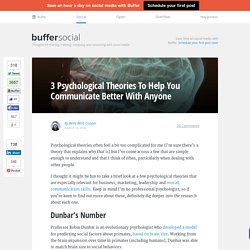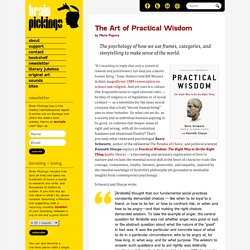

Are You a Head Person or a Heart Person? Imagine meeting a stranger and having a chance to learn what sort of person they are by asking just one question.

You might try the obvious: “Are you an introvert or an extrovert?” Or you could probe their political leanings: “Are you Republican or Democrat?” In each case, you’d hope the answer would tell you a fair bit about the person’s psychology. Here’s a question you probably wouldn’t think of, but which new research suggests could be surprisingly informative: “Do you think your ‘self’ is located in your heart or in your brain?” There’s some recent research history to this question: A series of studies published in 2013 asked this question to hundreds of undergrad students at North Dakota State University. Other studies in the series found that people who saw their self as located in their brain tended to perform better on general-knowledge tests and to react less emotionally to stress. Now, researchers have taken this idea in new, even more nuanced and interesting directions. Dr. 3 Psychological Theories To Help You Communicate Better With Anyone. Psychological theories often feel a bit too complicated for me (I’m sure there’s a theory that explains why that is) but I’ve come across a few that are simple enough to understand and that I think of often, particularly when dealing with other people.

I thought it might be fun to take a brief look at a few psychological theories that are especially relevant for business, marketing, leadership and overall communication skills. How to Cultivate Practical Wisdom in Our Everyday Lives and Why It Matters in Our Individual and Collective Happiness. By Maria Popova The psychology of how we use frames, categories, and storytelling to make sense of the world.

“It’s insulting to imply that only a system of rewards and punishments can keep you a decent human being,” Isaac Asimov told Bill Moyers in their magnificent 1988 conversation on science and religion. And yet ours is a culture that frequently turns to rigid external rules — be they of religion or of legislature or of social conduct — as a substitute for the inner moral compass that a truly “decent human being” uses to steer behavior. So what can we do, as a society and as individual humans aspiring to be good, to cultivate that deeper sense of right and wrong, with all its contextual fuzziness and situational fluidity? The Art of Wisdom and the Psychology of How We Use Categories, Frames, and Stories to Make Sense of the World.
Which Reasoning Style Best Describes The Way You Think? Emotional Intelligence: The Social Skills You Weren't Taught in School. Fixed vs. Growth: The Two Basic Mindsets That Shape Our Lives. “If you imagine less, less will be what you undoubtedly deserve,” Debbie Millman counseled in one of the best commencement speeches ever given, urging: “Do what you love, and don’t stop until you get what you love. Work as hard as you can, imagine immensities…” Far from Pollyanna platitude, this advice actually reflects what modern psychology knows about how belief systems about our own abilities and potential fuel our behavior and predict our success. The Psychology of Flow: What Game Design Reveals about the Deliberate Tensions of Great Writing. By Maria Popova “The books that give us the most pleasure, the deepest pleasure, combine uncertainty and satisfaction, tension and release.”

How stories change hearts and brains – Elizabeth Svoboda. Back in the fall of 1999, Norman Conard, a history teacher at the Uniontown High School in Kansas, asked his students to come up with a project for National History Day.

While brainstorming ideas, ninth-grader Elizabeth Cambers stumbled on an old clipping from US News and World Report. The story included the line, ‘Irena Sendler saved 2,500 children from the Warsaw Ghetto in 1942-43.’ Elizabeth asked her fellow ninth-grader Megan Stewart to help her with her project, and during her free time, Megan pored over the story of Irena Sendler. She learned about how this unassuming young Polish nurse had created thousands of false identity papers to smuggle Jewish children out of the ghetto. Imitation is what makes us human and creative – Kat McGowan. Imitation might be a form of flattery, but it is also a good way to end up in legal trouble.

More than 6,000 lawsuits over patent infringements were filed in the United States last year. Samsung and Apple, locked in what’s been called the bloodiest corporate war in history, have jointly spent more than $1 billion in the past four years trying to prove that one poached the other’s smartphone technology. In today’s world, inventors are our heroes and our saviours – the geniuses who keep the world economy surging forward, who bring us the newest playthings and the latest comforts.
We rely on inventors to build a cleaner, happier, more prosperous future. Copycats are a threat to this cheerful vision. Popular now Step by step, Americans are sacrificing the right to walk Is there such a thing as an almost-rape? The Psychology of Irrational Fear. Last week Sen.

Rand Paul, a doctor, laid out the threat of Ebola in America thusly, to CNN: Was Freud right about dreams all along? – Patrick McNamara. When I was a hormone-addled adolescent in the late 1960s and early ’70s, I would often look up at a poster of Sigmund Freud on my brother’s bedroom wall.

The title on the portrait – something like ‘Freud: explorer of the unconscious and discoverer of the meaning of dreams’ – depicted a hero of intellectual freedom and creative thought. When you looked at it closely, the portrait seemed to writhe and come alive. In the drug-fuelled style of those decades of ongoing sexual revolution, the artist had depicted the nose as an erect penis, the cheeks as a female behind, and the eyes as female breasts. One side of the face was a voluptuous female whose legs wrapped around the body of a muscular male on the other side of the face and, of course, both heads were thrown back in dramatised ecstasy. I recall some of my brother’s stoned friends gazing at the portrait with bewildered looks on their faces, apparently unsure if the writhing torsos they saw were really there or not. Popular now.
Why Cloudy Days Help Us Think More Clearly. By Maria Popova “Sunshine dulls the mind to risk and thoughtfulness.”

Don’t try to cure anxiety: we need it – Charlie Kurth. At a dinner party, you find yourself seated next to a man named Sam.

He’s a new acquaintance, but it turns out the two of you have several friends in common – so you’re keen to make a good impression. On that score, things seem to be going quite well. The talk is flowing and your companion gives every sign of finding you witty and engaging. And then, all of a sudden, the mood turns a little sour. Sam makes eye contact less frequently. Popular now. The Neuroscience of Emotions. Do psychiatrists think everyone is crazy? – Joseph M Pierre. When a psychiatrist meets people at a party and reveals what he or she does for a living, two responses are typical. People either say, ‘I’d better be careful what I say around you,’ and then clam up, or they say, ‘I could talk to you for hours,’ and then launch into a litany of complaints and diagnostic questions, usually about one or another family member, in-law, co-worker, or other acquaintance.
It seems that people are quick to acknowledge the ubiquity of those who might benefit from a psychiatrist’s attention, while expressing a deep reluctance ever to seek it out themselves. Jung’s Theory of Introvert and Extrovert Personalities. Personality refers to an individual’s pattern of thoughts, feelings and behaviors that make a person unique. There are multiple kinds of personalities we encounter in our day-to-day lives — strong, charismatic, open-minded, shy etc.
Carl Jung’s perspective on personality is quite insightful; he wrote that what appears to be random behavior is actually the result of differences in the way people prefer to use their mental capacities. Jung’s theory on personality types shows the various behavioural patterns and attitude. Using the theory, you can delve deeper into your own mind and comprehend your thoughts and feelings.
Was Freud right about dreams all along? – Patrick McNamara. When I was a hormone-addled adolescent in the late 1960s and early ’70s, I would often look up at a poster of Sigmund Freud on my brother’s bedroom wall. The title on the portrait – something like ‘Freud: explorer of the unconscious and discoverer of the meaning of dreams’ – depicted a hero of intellectual freedom and creative thought.
When you looked at it closely, the portrait seemed to writhe and come alive. In the drug-fuelled style of those decades of ongoing sexual revolution, the artist had depicted the nose as an erect penis, the cheeks as a female behind, and the eyes as female breasts. One side of the face was a voluptuous female whose legs wrapped around the body of a muscular male on the other side of the face and, of course, both heads were thrown back in dramatised ecstasy.
Sigmund Freud, the Never-Ending Storyteller. With Sigmund Freud, there are always two ways to begin. Here’s the first: Sigmund Freud was the genius of the twentieth century, without whom we would not know ourselves as intimately as we do. And here’s the second: Sigmund Freud was a colossal fraud who ruined innumerable lives. Sigmund Freud: The phrases you use without realising it. 18 September 2014Last updated at 19:36 ET By Jon Kelly BBC News Magazine It's 75 years since the death of Sigmund Freud, and the words and phrases he popularised are deeply ingrained in popular culture and everyday language. The 20 Best Lessons from Social Psychology. The Best Ways to Stay Updated on Psychology Research. Psychology research plays a major role in my self improvement journey. I like to learn as much as possible about our minds and how they work, so over the years I’ve come up with some really easy ways to make sure I don’t miss anything new and important that comes out.
This article describes the key things you can do to improve your own psychology research. Psychology. Psychology. Psychology & behaviour. Brain,Mind,Psychology. Psychology and Emotional Control. Psychiatry.